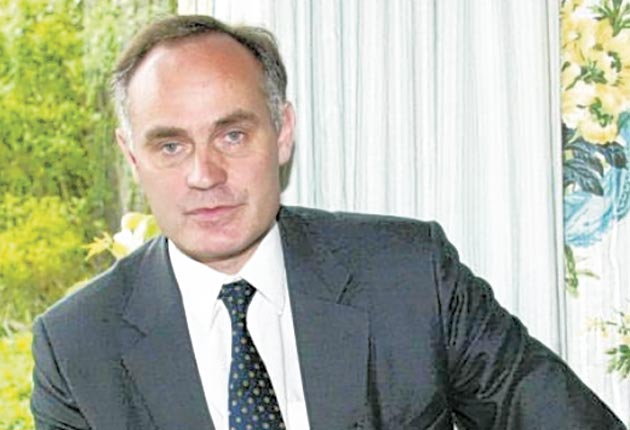Prisons minister leaves wife after revealing he is gay

Your support helps us to tell the story
From reproductive rights to climate change to Big Tech, The Independent is on the ground when the story is developing. Whether it's investigating the financials of Elon Musk's pro-Trump PAC or producing our latest documentary, 'The A Word', which shines a light on the American women fighting for reproductive rights, we know how important it is to parse out the facts from the messaging.
At such a critical moment in US history, we need reporters on the ground. Your donation allows us to keep sending journalists to speak to both sides of the story.
The Independent is trusted by Americans across the entire political spectrum. And unlike many other quality news outlets, we choose not to lock Americans out of our reporting and analysis with paywalls. We believe quality journalism should be available to everyone, paid for by those who can afford it.
Your support makes all the difference.A government minister who helped to soften the Tory party's policy on crime and punishment was at the centre of a personal crisis last night after announcing he had left his wife to confront his sexuality.
Crispin Blunt, 50, the prisons minister, said he had told his family that he had "decided to come to terms with his homosexuality". A statement from his office said that there was no third party involved and asked the media to respect his family's privacy.
Mr Blunt, a former Army officer who is the Conservative MP for Reigate in Surrey, married his wife, Victoria, in 1990. The couple have one daughter and one son.
The MP has attracted both praise and criticism for the key role he has played in reforming the Tories' traditional tough line on law and order. At the heart of the policy has been a U-turn on the use of prison so that non-serious offences attract community sentences.
But while prison reform groups have welcomed the Coalition's approach, Mr Blunt has been lampooned for some of the initiatives he has championed.
He was slapped down by Downing Street last month after saying he was lifting a ban in prisons on arts events such as comedy workshops and fancy-dress parties. No 10 overruled him the following day, ordering that there would be no such parties. He was also criticised for proposing a greater use of restorative justice where criminals who meet their victims could escape with a lighter sentence.
Last night, Mr Blunt set out the reasons for his decision to leave his wife. In a statement, his office said: "Crispin Blunt wishes to make it known that he has separated from his wife, Victoria. He decided to come to terms with his homosexuality and explained the position to his family. The consequence is this separation."
The statement added: "There is no third party involvement, but this is difficult for his immediate and wider family and he hopes for understanding and support for them. The family do not wish to make any further public comment and hope that their privacy will be respected as they deal with these difficult private issues."
As a government minister he has been at the centre of some of the most controversial policies.
Last month, Mr Blunt was associated with the government U-turn on granting anonymity to rape suspects.
The issue had not been in the Conservative or Liberal Democrat election manifestos, although it had been Lib Dem policy since 2006. The coalition agreement pledged to "extend anonymity in rape cases to defendants", with ministers stressing the need to "protect anyone who may be wrongly accused from harmful stigma".
But after Mr Blunt and his boss, the Justice Secretary, Ken Clarke, mounted a number of spirited defences of the proposed change to the law, the idea was quietly withdrawn.
Mr Blunt held a succession of frontbench roles while the Tories were in opposition between 1997, when he was elected MP for Reigate, and 2010.
Before entering Parliament, Mr Blunt served as an army officer for 11 years, and was stationed in Cyprus, Germany and the UK.
Subscribe to Independent Premium to bookmark this article
Want to bookmark your favourite articles and stories to read or reference later? Start your Independent Premium subscription today.
Join our commenting forum
Join thought-provoking conversations, follow other Independent readers and see their replies
Comments